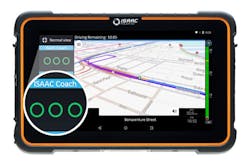How real-time coaching can boost fleet efficiency and safety
Since Tucker Freight Lines added real-time in-cab coaching to its fleet of dry vans and flatbeds two years ago, the carrier has increased its fleetwide mpg by one mile, saving drivers about $200 per week in fuel—around $10,000 per year. Along with better fuel efficiency, the fleet has become safer.
“The driver coach app really works well with for the driver because as they're driving down the road, they see immediate feedback, whether it's based on their acceleration or their coasting or whatever it may be in their driving performance,” Cody McClain, director of safety and human resources for Tucker Freight Lines (TFL), said during a Truckload Carriers Association webinar on real-time coaching.
The webinar was sponsored by trucking technology company Isaac Instruments, which offers real-time driver coaching integrated with its ELDs, and led by Jean-Sebastien Bouchard, Isaac’s co-founder and EVP of sales. “In the early days with Isaac,” he said, “I helped the team design real-time driver coaching algorithms that have grown today into the Isaac Coach, the real-time coaching service that’s available in-cab on our platform for drivers to generate fuel savings and be safer on our roads.”
McClain said that since his fleet—a mix of company drivers and owner-operators—started using the Isaac Coach, they’ve learned to appreciate how it makes them safer and more efficient drivers. “Sometimes company drivers don’t see why they should get better fuel economy,” he said. “We wanted to incentivize them and show them that if you are getting better mileage, we want to put that back in their pockets and into random fuel islands across the country.”
Using the Isaac Coach scoring system for fuel efficiency, TFL has incentivized its company drivers to be more efficient. “They’ve made great strides and see the benefits,” McClain said of the drivers. “Once they get their scores to certain places, they see money back in their own pockets.”
Deryk Gillispie, vice president of IT and innovation for Trimac, one of the largest tanker carriers in North America, said his company is also using the Isaac system to incentivize company drivers. “We get a weekly summary of all the operators’ results,” he said during the webinar. “Everybody above a certain threshold is entered into a drawing. Through our company recognition program and platform and some financial incentives, those folks receive a meaningful financial bonus for their performance that week.”
For the independent drivers at Trimac, they see incentives on their own as they spend less money on fuel since installing real-time coaching in their cabs, Gillispie said. “In some areas, our independent contractors consistently achieved much higher scores than our company drivers do,” he added. “And we believe this is attributed to the fact that several of those independent contractors really see and have observed and are experiencing the savings on fuel consumption. So they’re on board with the program.”
The Isaac Coach platform, which is installed under the dash, monitors and records more than 40 vehicle inputs,” Bouchard said. “We measure them over 100 times per second and we collect information to transfer it into something a driver is going to understand meaningfully,” he explained. “Specifically, it looks at progressive accelerations, anticipations, and hard maneuvers that will generate the fuel efficiency.”
The system also monitors shifting and cruise control, along with driver safety behaviors and critical safety events through its video camera system.
All of these actions—and inactions—are computed into the Isaac Coach Score, which coupled with real-time in-cab coaching leads to driver improvements in efficiency and safety, Bouchard said. “What’s really unique with the Isaac Coach is we’ve built an algorithm that won’t penalize the drivers for elements outside their control, meaning the aerodynamics, the wind, the load, the slope, the engine type,” he explained. “We all know the driver doesn’t control that. The driver controls the pedals, the steering, the gear he’s in.”
The system uses visual indicators on the in-cab display to coach the driver through maneuvers that the technology company said could save fleets as much as 15% in fuel costs. The system also allows fleets to create internal custom scoring systems used in conjunction with the Isaac Coach score.
“We’ve seen the correlations between the increase in efficiency and the safe driving habits,” McClain said. “The correlation is spot on. If someone’s being efficient and taking care of their equipment, they’re driving safely as well. To quantify it can be a little hard—but we’ve seen a reduction in DOT recordable accidents per million miles. We’ve seen a reduction in claims. We’ve seen a reduction in everything since we started this.”
About the Author
Josh Fisher
Editor-in-Chief
Editor-in-Chief Josh Fisher has been with FleetOwner since 2017. He covers everything from modern fleet management to operational efficiency, artificial intelligence, autonomous trucking, alternative fuels and powertrains, regulations, and emerging transportation technology. Based in Maryland, he writes the Lane Shift Ahead column about the changing North American transportation landscape.


